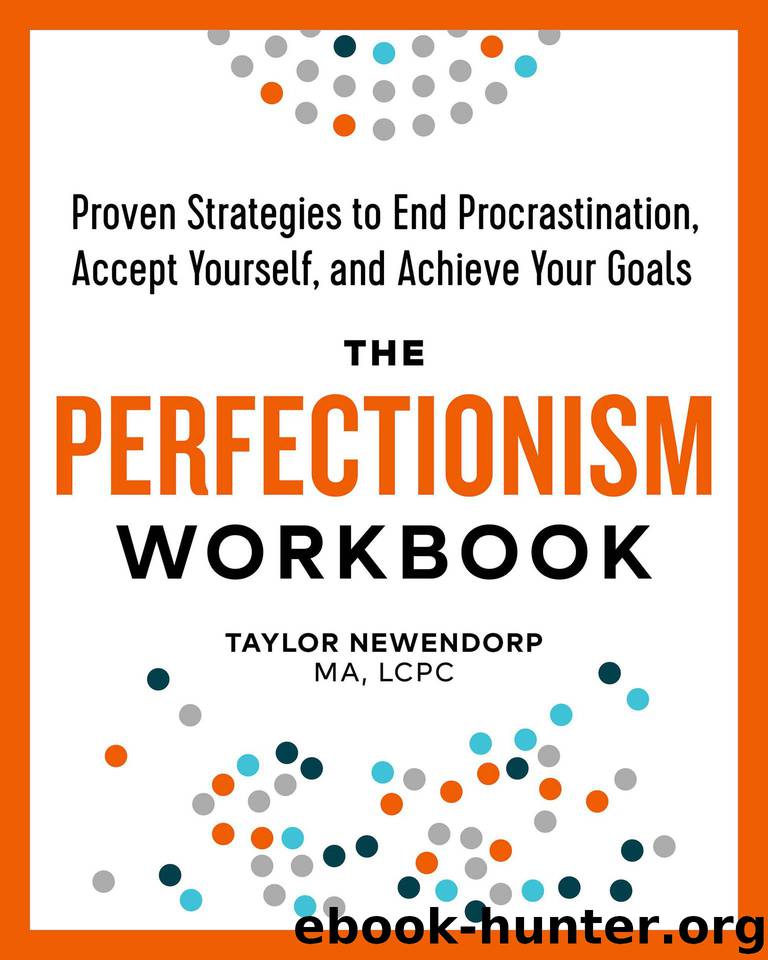The Perfectionism Workbook: Proven Strategies to End Procrastination, Accept Yourself, and Achieve Your Goals by Taylor Newendorp

Author:Taylor Newendorp [Newendorp, Taylor]
Language: eng
Format: epub
ISBN: 9781641520553
Amazon: 1641520558
Publisher: Althea Press
Published: 2018-07-24T04:00:00+00:00
One problem with holding on to negative beliefs about mistakes is that none of them are entirely accurate. There may be some elements of truth to them, but when they evolve into sweeping generalizations, they have crossed the line and become distortions. Ironically, the very perfectionists who are so overly concerned with making mistakes often experience errors in their thinking at the same time.
After I had met with Melinda a few times, I broached this idea with her (in a very polite and diplomatic way): “The good news is, you are already making mistakes all the time.” She bristled, shot me a dirty look, and then suddenly looked nervous. I completely understood why. I certainly do not like being told that I have done something wrong, let alone having someone accuse me of regularly making errors in my daily life. Furthermore, if I equate making mistakes with my being a disappointment as a human being, then I would be upset to hear someone essentially tell me that my worst fears have come true. But I didn’t intend to criticize or scare Melinda; in fact, I was trying to offer her words of encouragement.
Once you can recognize how some of your beliefs might be erroneous, you can begin adjusting them in a more constructive way. If you knew that something you had control over was not correct, wouldn’t you want to fix it? It is no different for a thought. Again, adopting a growth mind-set and acknowledging that your cognitive and behavioral patterns do not have to be set in stone can help you to challenge and reframe your thoughts using the techniques I have laid out previously.
MISTAKES IN CONTEXT
I had another reason for pointing out to Melinda that she was already making mistakes through her distorted self-talk. I wanted to address the myth she had created for herself that she was incapable of dealing with mistakes in general. Although she was unaware of it, Melinda had been coping with making many mistakes on a daily basis by telling herself inaccurate things like, I have to perform flawlessly , This needs to be executed perfectly , and There is no room for error here .
Now, I will concede that in some instances those statements might be true. However, this was not brain surgery. Melinda was applying those standards to almost every task she undertook, from writing and delivering a major report to her CEO to putting together her daughters’ Halloween costumes. I would wager there is much more room for error on the latter, but it was difficult for Melinda to see it that way.
Melinda began to look at how she viewed mistakes in different contexts as a way to start modifying her sweeping generalizations. While it was just as important to her to be the “perfect mother” as it was to be the “perfect employee,” she could recognize that messing up a detail on one of her daughter’s costumes had fewer potential negative ramifications for her life than missing something on that report to her CEO.
Download
This site does not store any files on its server. We only index and link to content provided by other sites. Please contact the content providers to delete copyright contents if any and email us, we'll remove relevant links or contents immediately.
| Behaviorism | Cognitive Behavioral Therapy |
| Existential | Gestalt |
| Humanistic | Jungian |
| Psychoanalysis | Transpersonal |
The Art of Thinking Clearly by Rolf Dobelli(8841)
The 5 Love Languages: The Secret to Love That Lasts by Gary Chapman(8494)
Mindhunter: Inside the FBI's Elite Serial Crime Unit by John E. Douglas & Mark Olshaker(7834)
Becoming Supernatural by Dr. Joe Dispenza(7105)
Nudge - Improving Decisions about Health, Wealth, and Happiness by Thaler Sunstein(6633)
The Road Less Traveled by M. Scott Peck(6633)
Enlightenment Now: The Case for Reason, Science, Humanism, and Progress by Steven Pinker(6405)
Win Bigly by Scott Adams(6311)
Mastermind: How to Think Like Sherlock Holmes by Maria Konnikova(6235)
The Way of Zen by Alan W. Watts(5798)
Factfulness: Ten Reasons We're Wrong About the World – and Why Things Are Better Than You Think by Hans Rosling(4021)
The State of Affairs by Esther Perel(3926)
Gerald's Game by Stephen King(3918)
Man's Search for Meaning by Viktor Frankl(3631)
The Confidence Code by Katty Kay(3566)
Thinking in Bets by Annie Duke(3531)
The Worm at the Core by Sheldon Solomon(2917)
Enlightenment Now by Steven Pinker(2915)
Liar's Poker by Michael Lewis(2811)
